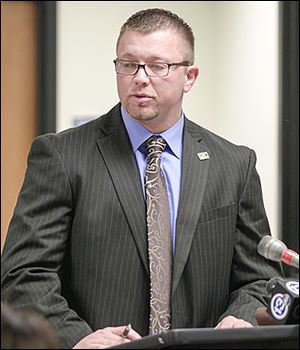
Toled Public Schools contract adjusts principals’ pay, review
3-year deal aimed at keeping district competitive
12/23/2013
District leaders, such as TPS Assistant Superintendent Brian Murphy, say wages were lagging behind suburban districts.
A labor contract signed last week by Toledo Public Schools and the union representing district administrators includes significant changes to some school principals’ pay and how new principals are evaluated.
The Toledo Board of Education approved a three-year contract Tuesday with the Toledo Association of Administrative Personnel, the union that represents about 300 principals and other administrative staff.
The contract includes many of the same wage provisions as those given teachers, including 1 percent raises Jan. 1 and at the start of 2015. But some administrators will receive significantly more under the contract, and new principals will now be evaluated under a peer-review system similar to one used for TPS teachers.
The district’s main goal was to offer a similar dollar amount, proportional to union membership size, to both Toledo Federation of Teachers and TAAP, Assistant Superintendent Brian Murphy said. How the money was distributed within TAAP was negotiable.
Administrators have fewer steps, or longevity increases, than teachers do on their salary schedule, which means administrators top out on pay quicker than teachers. Union officials presented data that showed a large differential in what TPS principals are paid compared to principals in surrounding districts.
In the past few years, TPS has lost several highly regarded principals to jobs in neighboring districts with the lure of better pay. District leaders and board members have expressed frustration that talent TPS develops often ends up in the suburbs and said budget constraints have inhibited their ability to match suburban district offers.
“It’s important for us to continue to be competitive,” Mr. Murphy said.
So while the schedule was increased 1 percent, TAAP and TPS agreed to take money that would have gone to step increases for all administrators and used it to create a classification for high school principals. By next summer, that classification will give high school principals $5,000 more than they would have received under the previous “step.”
Elementary principals also will see classification bumps, meaning larger pay.
The classification changes for principals means those administrators will receive significantly larger raises than others in the union. Still, the union voted overwhelmingly in favor of the agreement.
“There was a recognition that the gap was significant in some cases,” TAAP President Don Yates said.
Steven Flagg, a public school advocate and TPS watchdog, has long argued that the unionized status of TPS administrators and the current compensation system are the real reasons talented principals leave for other districts, not tight budgets. The current system, he said, “locks in mediocrity, provides no incentive to strive toward excellence, and creates a fertile ground to ‘poach’ the very best.”
Because TAAP isn’t going anywhere, Mr. Flagg said he’s suggested the district create a “compensation floor,” with individual administrators who are then allowed to negotiate raises based on performance and market forces.
The new agreement also creates a peer-review system for new principals. Under the old system, new principals receive initial three-year contracts, and the school board overwhelmingly renews their employment after those contracts end, Mr. Murphy said.
The state has mandated new evaluation systems for both teachers and principals that are weighted heavily on student performance. Under the new TPS system, principals who are rated “ineffective” in the second year of their initial contract will be given a peer mentor — an experienced principal who will offer support and advice.
Mentors will be assigned to such principals for the third year of their initial contracts. At that year’s end, the peer mentors will recommend to a committee whether their contracts should be renewed. The school board makes final decisions on employment for the district.
The union, Mr. Yates said, agreed not to take cases of nonrenewal to arbitration if the peer mentor recommended the action. The system is similar to the Intern Board of Review program, also known as the Toledo Plan, a long-running system for TPS teachers.
The Toledo Plan was the first teacher peer-review program and has long been heralded by the Toledo Federation of Teachers as an effective system that weeds out teachers not ready for the job. Union leaders say many more new teachers have been nonrenewed or terminated than would have under a traditional evaluation system.
But the peer-review system has faced criticism by groups who claim variously that it disproportionately eliminates minority teachers, that it ignores veteran teachers who struggle, or that it effectively cedes employment decisions to the union.
The TAAP negotiations lasted much longer than with the school district’s other two unions. But Mr. Yates said that, in the end, the union was happy not to be talking about cuts as it had in recent years.
Contact Nolan Rosenkrans at: nrosenkrans@theblade.com, 419-724-6086, or on Twitter @NolanRosenkrans.